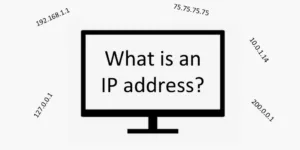An Internet Protocol address (IP) is your basic identity on the internet. It is an essential unique footprint that is needed to send traffic, like your internet related requests and messages, from one device to other on the internet. Your IP address allows your device to communicate with other devices over an Internet Protocol-based network, which is known as the internet.
What’s the use of an IP Address?
Think of it this way, you’re an individual among hundreds of millions of other individuals, and the only way to distinguish you is through your identification (name, social security number, etc.) Like that, an IP address provides an identity to a networked device.
Your IP address shows where you’re located on earth and becomes your address where data is the delivered and transmitted to other devices. Plus, devices on the same network are differentiated from one another through IP addresses. Typically, IP addresses look something like 152.101.100.1, 152.101.101.1, etc. You can say that they are basically four numbers of three digits separated by three dots.
To understand it better, let’s say you’re sending a parcel to your friend who lives in another country. To do so, you must have his accurate residence location as you just can’t use his name and assume it will reach him. A successful parcel would require the exact residence where your friend is currently staying at.
This same logic and process applies when sending and receiving data over the internet. Though, you won’t have to tell your device the IP address of where you want to send the data since it is almost impossible to remember numeric data of this type. This dilemma is solved by Domain Name System or Domain Naming Systems (DNS), whose job is to translate google.com to the IP address behind it. A DNS help you look up your IP and to find the IP address (location, area, device, etc.) of the individual you’re trying to send any data.
For example: when you want to access Facebook, you type in www.facebook.com and your request to get access to the page is then sent to a DNS server that searches the website for you and loads the page for you on your device. If your IP address was not present, there was no possible way to know what you want to access.
One could argue: why do we have IP addresses? Well, the reply to that is simple: why do our homes have addresses? It so that we are reachable. Essentially, an IP address has two parts, the network ID, and the host ID. However, from a perspective of a computer system, we’ve got 32 ones and zeros.
Types of IP Addresses
There are multiple types of IP addresses, and most common are private IP addresses and public IP addresses.
In brief, Private IP addresses are a subset of Public IPs and are mostly used in homes, offices and controlled areas. Private IP addresses make way for your devices to communicate with your router and all the other devices connected to your private network. Your router automatically chooses an IP address, and it can be set manually as well. Think of it this way, your ISP assigns a Public IP to your home or office router. Let’s say there are 20 devices in your office and all of them need to connect to the internet. Here, your private network will generate private IPs that will connect to the router and then access the internet.
The private IPs in this case are for internal use only, and the only IP accessing the internet is the Public IP of your router.
On the other hand, Public IP addresses are typically used outside in public areas and are assigned by your Internet Service Provider aka ISP. Basically, it allows you to communicate with the rest of the networked devices around the world through the help of the internet.
Furthermore, if you want your Public IP to always remain the same, then you would have to ask your ISP for a static IP. A dynamic IP, on the other hand, as the name suggests, is dynamic and can change as per the IP provider’s discretion.
What is my IP?
Now that you’ve got a firm understanding of what is an IP and how it functions, learn about what is your IP. While it’s not necessary to know your IP address but having a sound knowledge of your network, IP address(s) and connected devices can prove to be beneficial for you as you can monitor and limit access to others as you deem necessary.
Finding your IP is super easy as all you have to do is search for a website that can track your IP and location. Note that different devices and Operating Systems require unique steps to find the IP address. The way you find an IP address on your Mac device may not be the same way you find the IP address on your Android device.
Quick recap, IP addresses are unique series of numbers which identify computer devices on the internet. If you want to watch Netflix, you need an IP address, if you wish to talk to your loved ones across the continent, you need an IP address, if you wish to order products online, and you guessed it, no need an IP address.
Author
Osama Khan:
Osama Khan is a tech reporter and internet privacy and security enthusiast, who regularly shares his knowledge and ideas through this writings in an effort to make the internet a safe and secure place for all. Looking to connect? Send an email: [email protected] or follow @osamakhangt








